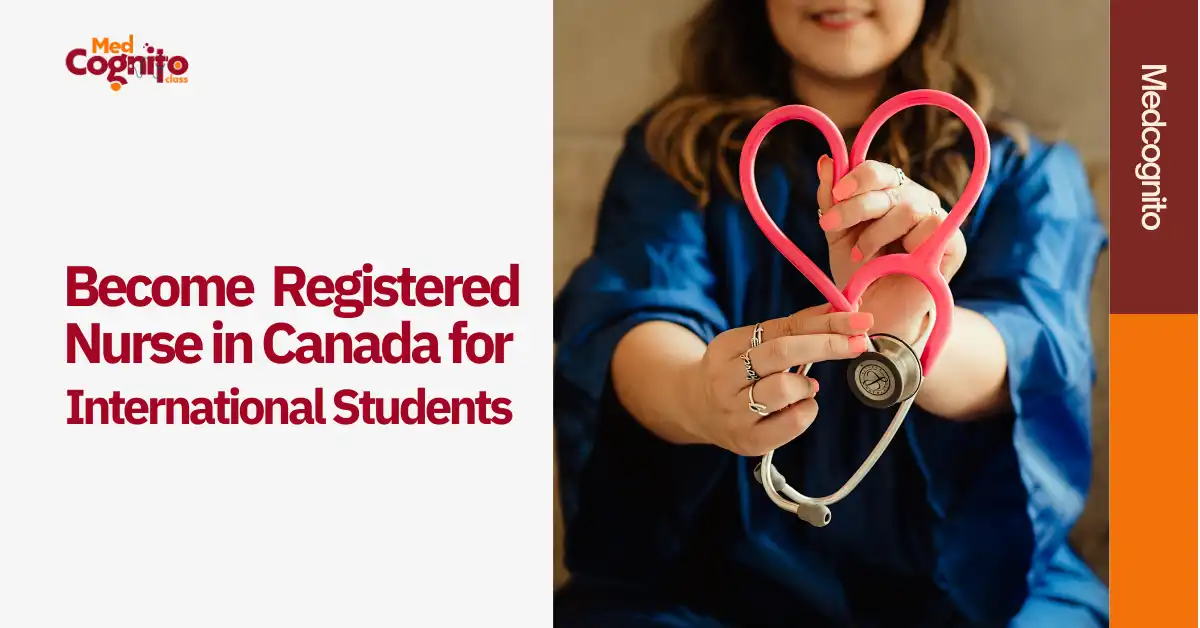Canada is one of the most sought-after destinations for aspiring nurses worldwide, offering high-quality healthcare, competitive salaries, and ample career opportunities.
If you’re an international student looking to become a registered nurse (RN) in Canada, this guide will walk you through the essential steps, from education to licensure and immigration.
Table of Contents
ToggleWhy Become a Registered Nurse in Canada?
Canada is experiencing a shortage of healthcare professionals, including nurses. The Canadian government has implemented various programs to attract internationally educated nurses (IENs) to address this gap. With competitive salaries, career stability, and a high standard of living, Canada presents a promising future for aspiring nurses.
Steps to Become a Registered Nurse in Canada
1. Obtain a Nursing Education
As an international student, you must complete a nursing education program that meets Canadian standards. Options include:
- Bachelor of Science in Nursing (BScN) – A four-year program required to become a registered nurse (RN).
- Practical Nursing Diploma – A shorter program leading to a career as a registered practical nurse (RPN) in some provinces.
- Bridging Programs – If you already have nursing education from another country, you may need a bridging program to meet Canadian nursing standards.
Many Canadian institutions offer nursing programs for international students, so ensure you choose one approved by the nursing regulatory body in your desired province.
2. Get Your Credentials Assessed by NNAS
The National Nursing Assessment Service (NNAS) evaluates the educational qualifications of internationally educated nurses (IENs). You must create an account on the NNAS website and submit:
- Academic transcripts
- Nursing license verification
- Employment history
- Proof of identity
Once assessed, you will receive an Advisory Report, which you will need to apply for licensure with the nursing regulatory body in your chosen province.
3. Meet English Language Proficiency Requirements
If English is not your first language, you must take an approved language test, such as:
- IELTS (International English Language Testing System)
- CELBAN (Canadian English Language Benchmark Assessment for Nurses)
Each province has specific language score requirements, so verify with the regulatory body where you plan to work.
4. Apply to a Nursing Regulatory Body
Each province and territory in Canada has its own nursing regulatory body, which governs the licensing process. Some examples include:
- College of Nurses of Ontario (CNO)
- British Columbia College of Nurses and Midwives (BCCNM)
- Nova Scotia College of Nursing (NSCN)
You must submit your NNAS report, language test scores, and other necessary documents to the regulatory body of your preferred province.
5. Pass the Licensing Exams
To become a registered nurse (RN) in Canada, you must pass the National Council Licensure Examination for Registered Nurses (NCLEX-RN). This standardized test assesses your competency as an entry-level nurse.
If you plan to become a registered practical nurse (RPN), you will need to take the REx-PN (Registered Exam for Practical Nurses) instead.
Additionally, some provinces require you to pass a Jurisprudence Exam, which tests your knowledge of Canadian nursing laws and ethics.
6. Gain Practical Experience (If Required)
Depending on your credentials and provincial requirements, you may need to complete a bridging program or supervised practice experience before obtaining full licensure.
7. Apply for a Work Visa or Permanent Residency
To legally work in Canada, you need a visa. Popular immigration pathways for international nurses include:
- Express Entry (Federal Skilled Worker Program) – A point-based system for skilled workers.
- Provincial Nominee Program (PNP) – Some provinces nominate nurses for immigration.
- Canadian Experience Class (CEC) – If you study or work in Canada, this pathway can lead to permanent residency.
8. Secure a Nursing Job in Canada
Once you receive your nursing license and work authorization, you can start applying for jobs in hospitals, clinics, long-term care homes, and community health centers. Platforms like Caring Support and government job boards can help you find nursing opportunities.
Prepare for the NCLEX with MedCognito
Passing the NCLEX-RN is essential for becoming a registered nurse in Canada. MedCognito’s NCLEX Prep Course offers expert guidance, practice exams, and study materials to help you succeed on your first attempt. Start your preparation today!
Final Thoughts
Becoming a registered nurse in Canada as an international student requires dedication, but the rewards are worth it. By following the steps outlined above, you can successfully navigate the process and build a fulfilling career in Canada’s healthcare system.
Start your journey today and take the first step toward becoming a registered nurse in Canada!
Frequently Asked Questions
Can an international student become a registered nurse in Canada?
The IEN Program is a 20-month full-time nursing pathway that includes English language support and mentorship, leading to a Bachelor of Science in Nursing (BScN) and eligibility for the Canadian Registered Nurses Exam (CRNE).
Can you become an RN in 2 years in Canada?
Yes, you can become an RN in 2 years in Canada by completing an accelerated nursing program like the IEN Pathway, which prepares graduates to take the Canadian Registered Nurses Exam (CRNE). Other 2-year options, such as Practical Nursing diplomas, qualify you as an LPN.
How much does it cost to study nursing in Canada for international students?
In Canada, the cost of a Bachelor’s in Nursing typically amounts to around CAD 40,000 per year, including tuition and living expenses. Undergraduate tuition averages approximately CAD 18,806 annually, while graduate tuition is around CAD 12,183. Additionally, living expenses range between CAD 10,000 and CAD 16,500 per year.
What are the requirements to be RN in Canada?
To study nursing in Canada, students must have completed high school with courses in English, Mathematics, and Biology for diploma or undergraduate programs, while MSc and postgraduate nursing programs require a recognized Bachelor’s degree along with proof of English language proficiency.




